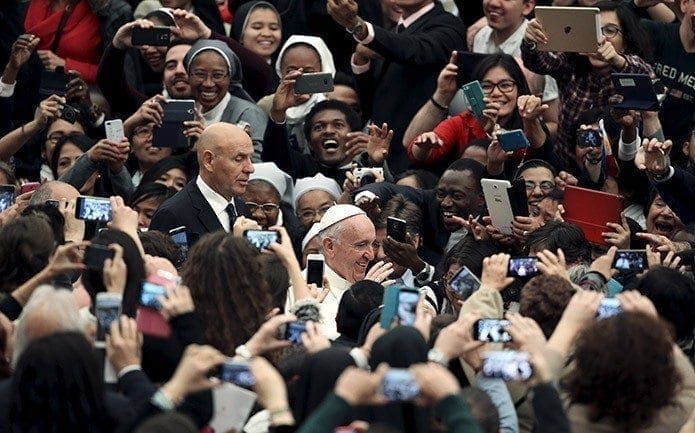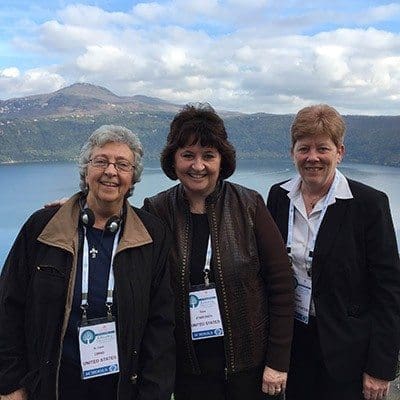 CNS photo/Stefano Rellandini, Reuters
CNS photo/Stefano Rellandini, Reuters Smyrna
School superintendent at Vatican congress ‘renewing passion’ for Catholic education
By NICHOLE GOLDEN, Staff Writer | Published December 10, 2015
SMYRNA—Diane Starkovich, superintendent of Catholic schools for the Archdiocese of Atlanta, is mulling over the experience of attending the World Congress on Catholic Education Nov. 18-21 in Rome and looking forward to sharing lessons learned with educators at home.
More than 2,000 educators and administrators took part in the congress, sponsored by the Congregation for Catholic Education and held in the Paul VI hall at the Vatican and the pope’s summer residence, Castel Gandolfo.
The Congress, “Educating Today and Tomorrow: A Renewing Passion,” marked two separate anniversaries.
“It is 50 years since the Vatican issued its document on Catholic education,” explained Starkovich. “It was also the 25th anniversary of the Vatican document issued for colleges.”
The Second Vatican Council declaration on Christian education, “Gravissimum Educationis,” was proclaimed in October 1965 by Pope Paul VI. It underscores the universal right to an education, true liberty in choice of schools, and the church’s duty to provide education.
St. John Paul II’s apostolic constitution on colleges, “Ex Corde Ecclesiae,” outlined the mission and identity of Catholic universities and formation of new institutions, emphasizing close communion with local churches and bishops.
As a result, the congress she attended had “two strands,” said Starkovich.
Near the end of his pontificate, Pope-emeritus Benedict XVI anticipated the golden anniversary of the Vatican II document and the fact that no new documents on faith-based education had been issued. His successor, Pope Francis continued with the plans to hold a World Congress at the Vatican.
Last October, Starkovich received correspondence from the Congregation on Catholic Education announcing the meeting and inviting administrators worldwide to consider attending.
“I got a letter, and I asked the archbishop, ‘Does this look official?’” recalled Starkovich, who had not previously heard any rumblings about the event.
Archbishop Wilton D. Gregory verified the letter’s authenticity. Starkovich realized it would be a once-in-a-lifetime opportunity to hear Catholic educators from across the globe speak.
Congress organizers began the process with a worldwide survey. Questionnaires were sent to bishops, religious congregations, associations and educators.
“They really wanted to know about the state of Catholic education. What is it today about Catholic education?” said Starkovich. “What are our ongoing blessings? What are our concerns? What are the challenges and where do we go, moving forward?”
The results of the survey revealed four basic themes—identity and mission of Catholic schools, the protagonist of Catholic education, the formation of principals and teachers, and new challenges.
Congress organizers asked participants to read the original Vatican documents. Starkovich was familiar with them as a graduate of the Catholic Educational Leadership and Policy Studies’ doctoral program at The Catholic University of America. “It was a good time for me to review them,” said Starkovich.
“Catholic educators, I think anywhere in the world, look to the Holy See. They look to Rome for direction,” said Starkovich.
“Gravissimum Educationis” and “Ex Corde Ecclesiae” are documents rich in direction, vocabulary, tradition and culture, she noted.
Strong concern about Catholic identity
One of the common stories discussed among congress participants was the decline of Catholic schools. While enrollment is down slightly this year in Atlanta, said Starkovich, decline is a worldwide trend.
“It’s something all of us should be concerned about,” said Starkovich.
She said her ultimate hope is that the global gathering will stir the Congregation on Catholic Education to issue new documents, a roadmap for where Catholic schools should be 50 years from now.
Starkovich and other American school superintendents were part of a delegation of some 80 members, organized by Fordham University in New York. The group included educators from Slovakia and Brazil, and Starkovich said it was a great pleasure to have conversations with them about education.
Fordham’s faith-based education delegation visited the U.S. Embassy to the Holy See and met Ambassador Kenneth Hackett, whose children while living in the United States were Catholic school students. Group members also attended Mass at the tomb of St. Peter in St. Peter’s Basilica and enjoyed a tour of the Vatican Museum.
A luncheon at Casina Pio IV within Vatican City concluded with a glimpse of Pope Francis yards away, getting into a vehicle. Security, in the wake of the recent terror attacks in Paris, was extremely tight, said Starkovich.
On the opening day of the congress, programs were held in the Paul VI hall at the Vatican, where the pope holds his general audiences.
Transistor radios and smartphones enabled attendees to hear translations of programs in English, Italian, Spanish and French.

Superintendent of Schools for the Archdiocese of Atlanta Diane Starkovich, center, visits with Sister Carol Cimino, superintendent of schools for the Diocese of Buffalo, New York, at left, and Susan Murphy, superintendent of schools for the Archdiocese of Santa Fe, New Mexico, at Castel Gandolfo, the pope’s traditional summer residence. They were among 2,000 educators participating in the World Congress on Catholic Education in Rome Nov. 18-21.
Although there were some Wi-Fi hitches the opening day, things went smoothly for the subsequent days’ programs held at Castel Gandolfo.
She said the Castel Gandolfo programs were intense and interesting. Speakers included Father Boutros Azar, general secretary for Catholic schools in Lebanon; Professor Elinor Ford of Fordham; and many other educational leaders from Africa, Europe and Australia.
Many of the programs were “always drawing us back to renewing our commitment,” said Starkovich.
Leaders were urged to carry a message back to their respective dioceses and schools—that while there are challenges all must stay focused.
Another commonality among those attending was how to keep the unique distinctiveness of Catholic schools whether that school is in an African hut or a new building in an American city.
“Everyone was strongly concerned about maintaining Catholic identity,” said Starkovich.
Religious sisters originally formed and staffed Catholic schools, and keeping the faith integrated throughout the day and in classroom activities was natural. Now that lay people make up 97 percent of those delivering Catholic education, it is more of a concern to keep identity and mission intact, said Starkovich.
“That’s a concern we all have,” she said. “How do we form our teachers and principals?”
One of the concrete suggestions, she said, was to have educators and administrators be more involved in service.
Providing strong Catholic formation and offering academics second to none must be done in a deliberate fashion, said Starkovich.
With those two points “you have the beauty of the Catholic school system,” she emphasized.
Papal challenge not to be rigid or elite
The conclusion of the four-day congress was an audience with Pope Francis who spoke and also answered questions for more than 45 minutes.
Starkovich said the audience hall was packed with additional guests—teachers who were invited to come with their children. The program included multimedia presentations and children singing and dancing.
“You leave the best to the last,” said Starkovich about the closing session.
“The Holy Father walked down the center aisle. It was a pep rally and not a pep rally. It was a gathering. It was pure joy.”
Pope Francis looks serious and reflective, said Starkovich, but changes when he begins to speak. “That true love and the feelings come out,” she said.
Father Ron Nuzzi of Notre Dame’s Alliance for Catholic Education had purchased low-cost transistors for many group members so that no one would miss the pope’s remarks.
“The Holy Father talked about the Year of Mercy and how people who are educators can’t be rigid,” said Starkovich.
She said while the pope briefly mentioned that teachers deserve respect and adequate pay for their contributions, it was not an emphasis of his speech.
Pope Francis called working with the family no matter what the family looks like “an absolute necessity,” said Starkovich.
She said, “all of that came to me as ‘community’.”
At one point, said Starkovich, Pope Francis told them to take risks, and when you fall to get back up again, and put one leg in front of the other.
“Yes, he challenged us,” said Starkovich. “We have to look to the future. We have to be creative.”
Another emphasis of the Holy Father’s discussion is that every child has the right to an education.
“Catholic schools cannot become elite,” she said.
Starkovich feels the experience of fellowship with educators worldwide in Rome is comparable to Olympic athletes coming together and sharing a noble endeavor. In this instance, the endeavor is a relaunching of the church’s dedication to education.
“I think we may have been part of history,” said Starkovich. “I just felt very privileged to be able to go.”


